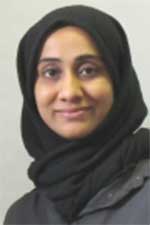Geriatric Medicine Fellowship
The one-year, ACGME-accredited Geriatric Medicine Fellowship program at Northwestern University Feinberg School of Medicine provides fellows with the knowledge, skills and experience necessary to achieve excellence in clinical geriatrics, teaching and research.
About the Fellowship
Director's Message
Thank you for your interest in the Geriatric Medicine Fellowship Program at Northwestern.
Our program offers excellent clinical training, a comprehensive educational program, research experience, and opportunities for professional development. During rotations at Northwestern Memorial Hospital and the Shirley Ryan AbilityLab and longitudinal clinical experiences in the ambulatory care geriatrics practice at Northwestern and at The Clare, a nearby CMS designated 5-STAR continuing care retirement community (CCRC), fellows encounter and manage a broad spectrum of medical conditions and geriatric syndromes. Our dedicated and knowledgeable geriatrics faculty and interprofessional team members work closely with fellows at all sites providing supervision and teaching. Beyond the fellowship, we are housed in a world-class health system and university that are international exemplars in patient care, research, and community engagement. I have been at Northwestern since 2016 and couldn’t be prouder of our division’s growth and continued successes. We are excited to welcome you and share more about our team and training program.
Sincerely,
Sara M. Bradley, MD, FACP, AGSF
Associate Professor
Division of Geriatrics and Department of Medical Education
Northwestern University Feinberg School of Medicine
Education
The fellowship program offers clinical experiences covering the full spectrum of problems confronted by aging individuals.
A typical fellowship year includes:
- Longitudinal clinical experience in weekly Geriatrics Ambulatory Care Clinics based at Northwestern Memorial Hospital, skilled nursing facility (SNF) rounds at The Clare, a nearby CMS designated 5-STAR continuing care retirement community (CCRC), and monthly home care program/ALF visits.
- Monthly Block Rotations including palliative care, geriatric psychiatry, movement disorders, cognitive neurology, bone health, urogynecology, rheumatology and inpatient consults.
- Education Sessions:
- Weekly didactic session cover core geriatric topics as well as content related to professional development, teaching, and research.
- Quarterly Journal Club
- Board Review Sessions
- Monthly Geriatric Grand Rounds and Weekly Department of Medicine Grand Rounds
- Protected time to participate in the American Geriatrics Society’s Leadership and Lifeskills Course, Geri-A-FLOAT, Geriatric Medicine Fellows Learning Online, and the PALTC/AMDA Futures program
We also provide the following supplementary resources for fellows:
- Subscription to The Geriatrics Review Syllabus
- Certified Medical Director (CMD) Mentored Fellowship Experience for those interested.
- Abstract submission fees and attendance cost at one national conference
Research
Our fellowship seeks to graduate inquiry-driven geriatricians. Fellows are encouraged to participate in a research project under the mentorship of a faculty member.
Fellows also must complete a quality initiative project during the program's tenure that focuses on an existing or emerging geriatrics safety issue and submit an abstract of this work for poster and/or oral presentation to a relevant national society meeting.
Past Geriatrics Fellows have conducted research in:
- The usability of AI-based negotiation training programs for caregivers of older adults with Alzheimer's Disease
- Voice-controlled intelligent personal assistants to support aging in place.
- The mistreatment and wellness among international medical graduates in U.S. general surgical residency.
- Screening, differential diagnosis, evaluation, and treatment of falls
- Nursing-driven programs for fall risk screening in emergency departments.
- Frailty status and outcomes after transcatheter aortic valve implantation.
- The evolution of living kidney donation and transplantation in older adults.
- The effects of improv training on older adults in long-term care facilities.
- The detection of delirium in hospitalized older general medicine patients.
- Selecting and supporting caregivers of older adults.
Clinical Experience
Our faculty comprises experienced and dedicated geriatricians with clinical foci and research backgrounds in dementia, home-based geriatrics primary care, transitions of care, aging in place and falls.
The fellowship program offers clinical experiences covering the full spectrum of problems confronted by aging individuals. Program sites include Northwestern Memorial Hospital, the Shirley Ryan AbilityLab, The Clare and The Selfhelp Home, where fellows work with expert faculty and robust interprofessional teams.
Eligibility
For candidates applying for the 2026-2027 entering class, our application process and requirements are as follows:
- All applicants must have successfully completed an ACGME-accredited Internal Medicine or Family Medicine Residency program and be eligible for the American Board of Internal Medicine's certification exam prior to the start of fellowship training.
- The fellow must have passed USMLE I, II and III at the time of application to the program and all scores must be made available.
- All applicants must be eligible for an unrestricted Illinois Medical License prior to beginning training.
- If applicable, applicants must have a valid ECFMG certification and be a U.S. citizen, Permanent Resident (green-card holder) or hold a J-1 visa.
Application Process
We are currently accepting applications through the ERAS system ONLY.
A complete application includes:
- A personal statement
- Three original letters of recommendation (including a letter from your program director)
- USLME or COMLEX scores
- The ERAS application form
Current Fellows

Sasha Faye Jones, MD, MPH
Medical Education: Tulane University School of Medicine, USA
Residency: University of Illinois - Chicago

Sarah Rabbani, MB, BS
Medical Education: Bahria University Medical & Dental College, Pakistan
Residency: Rosalind Franklin University
Most Recent Graduates
Jeanette Cheng, MD (2024-25)
Nevin Kamal, MD (2024-25)
Jason Pe, MD (2023-24)
Instructor, Division of Hospital Medicine, Lake Forest Hospital, Northwestern Medicine
Harsimran Singh, MD (2021-22)
Hospital Medicine, Kaiser Permanente, Union City, CA
Judith Ukabam, MD (2020-21)
Private practice, Geriatric medicine, Hartford HealthCare Medical Group, Bloomfield, CT